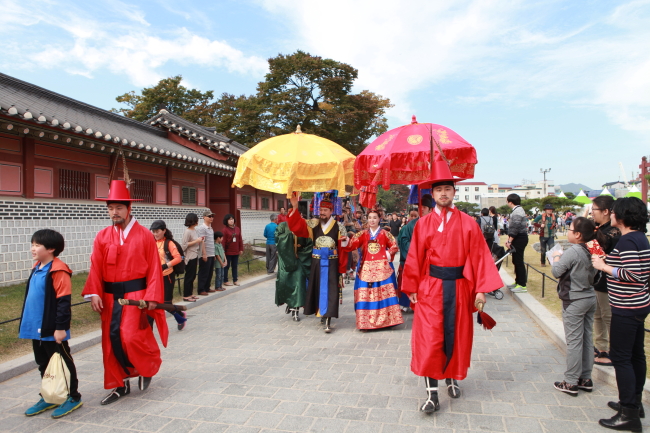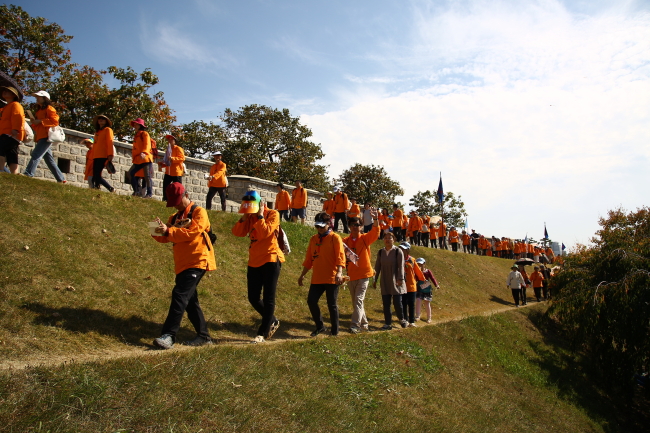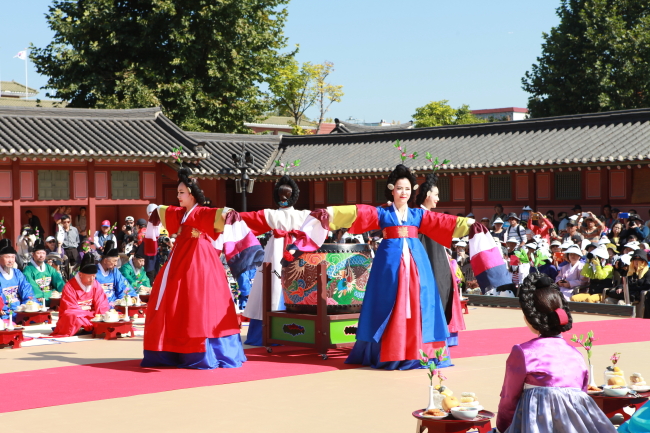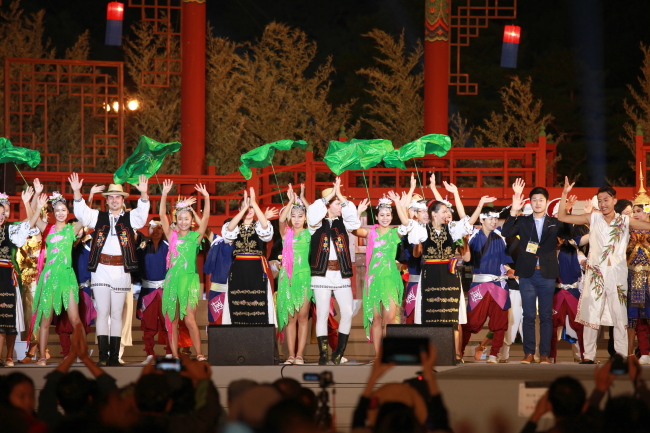King Jeongjo, the 22nd king of the Joseon Dynasty (1392-1910) and the son of ill-fated Crown Prince Sado, wanted to build a “utopian city” in Suwon, Gyeonggi Province that could be benchmarked by other cities across the country.
This was where King Jeongjo wanted to retire after handing over his throne to his son, King Sunjo.
 |
The reenactment of King Jeongjo taking a stroll at Hwaseong Fortress (Suwon City) |
Hwanseong Fortress and Hwaseong Haenggung Palace in the region have gained attention from locals and foreign tourists over the years, spurred by the well-known historical tale between King Jeongjo’s father Sado and Sado’s father King Yeongjo.
This true but tragic story has been made into numerous films and TV dramas, including the recent box-office hit “The Throne,” featuring Crown Prince Sado who was condemned to death in a rice chest by his father King Yeongjo (played by Song Kang-ho) after a bitter conflict between the two. King Jeongjo was there to watch his father die in the rice chest, vowing to restore his father’s honor in history. There was also the period drama movie “The Fatal Encounter,” about an assassination attempt on King Jeongjo and his rise to power after overcoming opposition.
A lot of people might commonly associate Hwaseong with his family story, but Hwaseong represents King Jeongjo’s vision for reforms for a better world that did not become fully realized during his reign.
 |
Tourists in traditional straw shoes stroll around Hwaseong Fortress. |
Suwon City has been striving to promote this part of Korea’s culture heritage with respect to King Jeongjo and his value through the annual Suwon Hwaseong Cultural Festival over the years.
The festival, in its 52nd year, will take place in the Hwaseong Fortress, which was designated a UNESCO World Cultural Heritage Site in 1997, offering a variety of cultural programs and performances for visitors to learn and experience Korea’s history and King Jeongjo.
The four-day festival from Oct. 8-11 will allow visitors to “participate in” rather than watch programs held inside the fortress and palace, according to Suwon City.
“The concept for this year’s festival will be ‘participatory’ allowing people to enter the four gates of Hwaseong Fortress and take part in events,” said the Suwon administrative office.
The fortress has four gates facing the cardinal directions of north (Janganmun), south (Paldalmun), east (Changnyongmun) and west (Hwaseomun). This was where King Jeongjo paid respect to his father, who was buried nearby in Suwon.
 |
Suwon Hwaseong Cultural Festival holds the reenactment of King Jeongjo’s mother Queen Hyegyeonggung Hong’s Birthday Feast. |
The festival will have grand fireworks, and the reenactment of King Jeongjo’s mother Queen Hyegyeonggung Hong’s Birthday Feast, as well as traditional musical performances inside the Hwaseong Haenggung Palace.
Under the theme of “Peace Through the Mix of Martial Arts and Dances,” the festival will have a nighttime performance illustrating the state visions of King Jeongjo in front of the eastern Changnyongmun Gate.
Also, some 1,000 people are expected to participate in the reenactment of King Jeongjo’s Royal Parade to His Father’s Tomb.
Marking 220 years and becoming tourist destination
Next year, Suwon will mark 220 years since the completion of the construction of Hwaseong Fortress in 1796.
The city will not only hold monthly events to celebrate the fortress’ 220-year anniversary beginning in January 2016, but also will seek to promote Suwon and the Korean history involving King Jeongjo overseas.
This is part of efforts for Suwon to become a “comprehensive tourism destination.”
 |
Foreign performers from five countries, including Cambodia, Vietnam and China, which Suwon City has friendly ties with, celebrate the opening of the Suwon Hwaseong Cultural Festival. |
Suwon City will mobilize 27 of its administrative units and invest some 17 billion won ($15 million) to create and hold tourism programs every month from January 2016 to February 2017 to attract 6.5 million visitors to the city.
The so-called “Suwon Hwaseong Visit Year” will kick off with a music concert at Suwon Gymnasium featuring the Suwon Philharmonic Orchestra & Civic Chorale in January.
In February, the city will also hold traditional music concerts and events where people can experience folk games.
As the hometown of Park Ji-sung, the 2002 Korea/Japan World Cup soccer player, Suwon will seek to foster young football players.
Other sporting events in Suwon next year include a marathon competition in April and an international youth soccer match.
There are about 1.2 million people living in Suwon, Gyeonggi Province. It is the country’s eighth-biggest city, whose slogan is “We welcome people. Human city, Suwon.” Suwon is one-fifth the size of Seoul.
Suwon is known for serving the region’s best premium grilled spareribs and roasted chicken. In addition to Suwon Hwaseong, the city also has Gwanggyo Lake Park, Korea’s biggest park which consists of two lakes and six theme park areas where visitors can enjoy walking and riding bikes. The park, which is twice the size of Ilsan Lake Park in Goyang, Gyeonggi Province, won a national award for having the most beautiful landscape in 2014.
For more information on the Suwon Hwaseong Cultural Festival, visit
http://shcf.kr or call (031) 290-3596.
(
hkp@heraldcorp.com)(fob140@heraldcorp.com">
hkp@heraldcorp.com)(fob140@heraldcorp.com)











